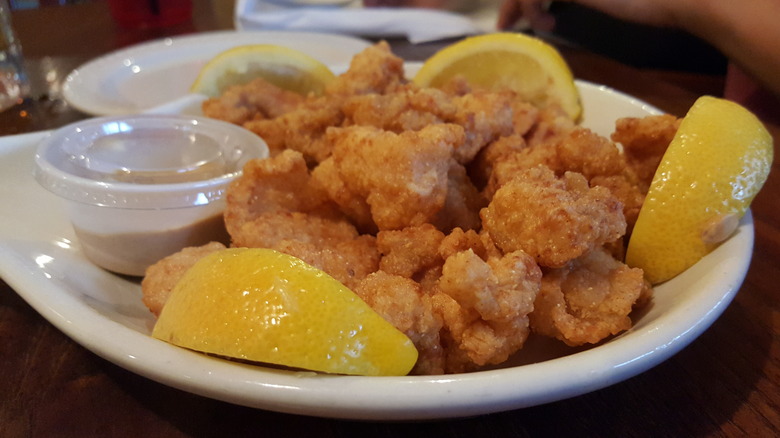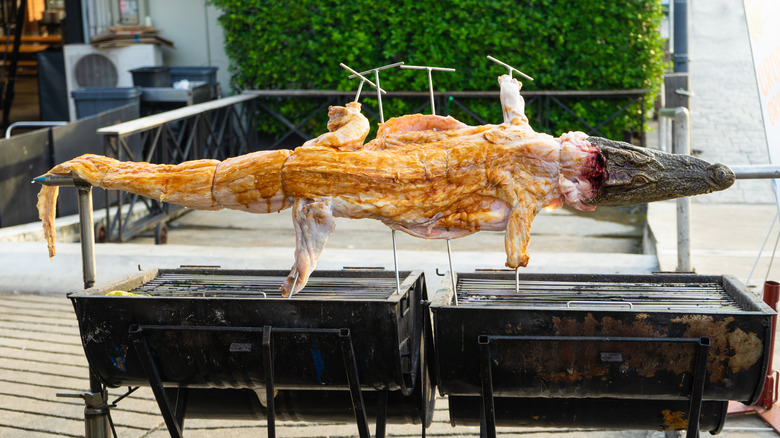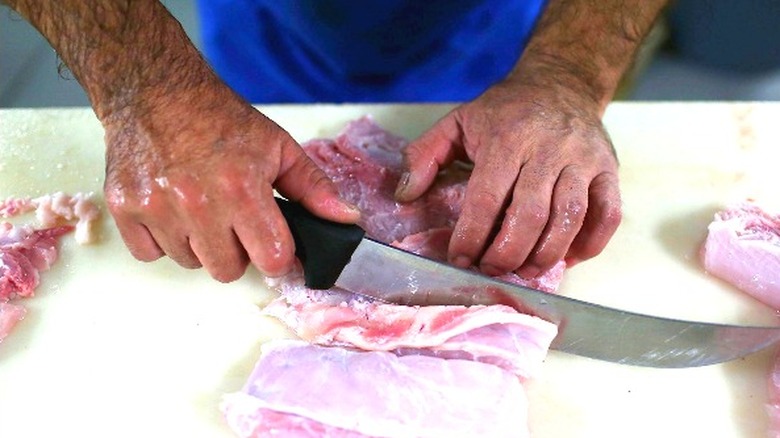What Is Alligator Really And What Does It Taste Like?
There are countless ways to prepare proteins like chicken and beef, but even with the seemingly endless number of recipes posted on the internet, it can get tiring to continue eating the same things over and over again. If you're starting to feel a bit of taste fatigue with your favorite dishes, it might be time to venture out of your comfort zone and try something new, and alligator meat might be the perfect thing to help spice up your diet.
Affectionately referred to as the "chicken of the swamp" down south (via Steaks And Game), this regional delicacy may be a turn-off to many for the sheer fact that it is a nontraditional protein source, not to mention that the actual animal it comes from is a little scary. However, you may be surprised to learn that the meat from these reptiles is surprisingly versatile and nutritious, making it an excellent option for those looking to shake up their normal eating routine. We'll admit that trying new foods can be a bit nerve-racking, especially when it comes to exotic meats, but if you're ready to give this swamp creature a taste, you might not be disappointed.
What is alligator really?
We're not doubting your intelligence here – we know you know what an alligator is in general, but how much do you know about actually feasting on the reptile? According to Tastessence, gators have been a protein source for thousands of years and were even considered a delicacy during China's Ming Dynasty, wherein they were served at events like wedding celebrations. Though still somewhat of a rare menu item, alligator meat is eaten much more often these days, especially in the southern region of the United States where Culinary Lore says that the American Alligator (Alligator mississippiensis) is typically found. This is one of only two species of alligators left roaming the earth today, with the other being the Chinese alligator (Alligator sinensis), which, as you probably could have guessed, is native to China.
When you do find a restaurant or vendor selling alligator, you could be eating one of several parts of the animal, though the actual classification of the different cuts is a slightly confusing topic that has long been debated. Most people consider alligator to be a type of meat, which is how we'll be referring to it in this writing. However, Med Munch notes it is classified as fish in the Catholic Church, meaning that those following the religion are able to eat it during the Lenten season.
What does alligator taste like?
Alright, now it's time to get into the reason that you're really here – to find out what alligator actually tastes like. You've probably heard that many exotic meats taste like chicken, but while this cliche is often used for a few laughs in TV and movies, it turns out that the phrase sort of rings true when it comes to this reptilian delicacy. Per Med Munch, alligator usually has a chewy texture and in terms of flavor is similar to poultry but with a slight fishiness to it.
However, the taste does change a bit depending on what part of the gator the meat is actually from. Tail meat, for example, is said to be the most delicate part of the gator with a flavor that is most likened to chicken. It is comprised mostly of white meat and is described as being tender and juicy, while the body and legs of the reptile contain dark meat that is tougher as well as stronger in taste. You can also indulge in alligator ribs, which Med Munch says have a "vibrant, rich flavor."
Of course, the taste of an alligator dish also depends on the method of preparation as well, which brings us to our next subject.
How do you cook alligator meat?
As we previously mentioned, there are several different cuts of alligator meat available for purchase, each of which can be cooked in a variety of ways. Per Steaks And Game, restaurants typically go the fried route with the tail meat, crisping it up until it's golden brown and serving it with ranch or even a rich remoulade sauce on their appetizer menu, or possibly in a po' boy sandwich. Alligator legs are prepared similarly, though, on the menu, you'll probably see these listed under the guise of alligator "wings" – perhaps to make them more appealing to the masses.
If fried foods aren't your thing, there are still plenty of ways that you can go about whipping up some gator for your next meal. The tenderloin, which is found in the tail, is one of the easier parts to work with, as it can be portioned into steaks or filets and prepared like any other type of meat on the grill or pan, and also makes a great addition to gumbo or jambalaya. Body meat, meanwhile, can be ground up and combined with other types of meat to make burgers or sausages and is also great braised, per Nola. The final cut of gator meat you'll find comes from the ribs, which can be prepared just like the pork ribs you're familiar with. Try coating them in a flavorful dry rub or a sweet, citrus-based marinade before smoking, grilling, or braising them for your next barbeque (via Med Munch).
Where to buy alligator meat
At this point, you might be ready to channel your inner Andrew Zimmern and give alligator meat a try. A restaurant close to you serving up traditional southern fare might have it on its menu, and a quick internet search for "gator bites" might lead you in the right direction. Pro tip: if several options come up, look for an eatery that specifically specializes in Louisiana Creole cuisine to get a platter of alligator that is closest to how it is traditionally prepared.
Finding alligator meat to cook yourself may prove to be a bit more difficult. Natives to the Southern part of the United States, especially those dwelling in Louisiana or Florida, may be able to head to a local grocer or butcher shop to pick some up, as this is where most alligator farms are located (via Steaks And Game). However, if you're living in another part of the country, Culinary Lore says that there are a number of online retailers that can ship frozen, pre-cut alligator meat straight to your door.
Nutritional information about alligator
Not everybody can be easily coaxed into going outside of their comfort zone and trying new foods, especially when said food comes from a notoriously dangerous – and slightly terrifying – animal. However, if you haven't yet been convinced to give alligator a try, learning a little bit about its nutritional value may help get you on board. Unless it's fried, gator meat is actually a surprisingly healthy option, ringing in at 232 calories per 3.5-oz. serving, according to Livestrong. Even better, the meat from this reptile is low fat, carb-free, and full of protein, with that same 3.5-oz. portion containing almost 46 grams, nearly double the amount found in a rib-eye steak of the same size. We're going to continue with the gator lovefest a little longer, as Med Munch reports that this lean meat is also full of iron and omega-3 fatty acids, helps build muscle, and can also help reduce the risk of diabetes and obesity.
As you can see, alligator meat is far less scary than the creature itself and can actually be incredibly beneficial to incorporate into your diet. Go ahead and give this exotic meat a shot the next time you see it offered at your favorite restaurant or your local butcher – you never know what it'll lead you to try next.





